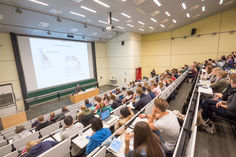FOXP1 Syndrome – a neurodevelopmental disorder with cognitive deficits and autistic behavior
RESEARCH GROUP

Manuel Stuhlinger (MD student), Jing Wang (MD/PhD student), Henning Fröhlich (Dr.rer.nat.), Nina Schneider (MD student), Gudrun Rappold (director) ( from left to right)
RESEARCH FOCUS
FOXP1 mutations are among the most recurrent de novo mutations associated with autism spectrum disorder. Patients with heterozygous FOXP1 mutations display intellectual disability, autism spectrum disorder and speech and language deficits. FOXP1/Foxp1 encodes a transcription factor with an enriched function in the striatum. We have shown that neuronal-specific Foxp1 conditional knock-out mice exhibit autism-relevant repetitive behavior and and reduced social interaction. Heterozygous Foxp+/- mice, which reflect FOXP1 haploinsufficiency, display cognitive and motor deficits including reduced neonatal ultrasonic vocalisation, reduced grip strength and altered gastrointestinal motility and function.
Impaired mitochondrial function can affect cognitive and motor performance in people with neurodevelopmental disorders. Mitochondrial dysfunction and oxidative stress may also explain cognitive and muscle impairment in Foxp1+/- mice and patients with FOXP1 syndrome (ongoing project).
We are investigating preclinical treatment strategies in mouse that may be transferable to humans with FOXP1 syndrome, which hopefully lead to a better outcome for patients than current treatments can offer (ongoing project).
Project Leader

![[Translate to English:] [Translate to English:]](/fileadmin/_processed_/8/2/csm_20131204_Beratung_035_a396c6c6e5.jpg)
![[Translate to English:] [Translate to English:]](/fileadmin/_processed_/a/0/csm_20170627_PflegeOrtho_001_fb912471fa.jpg)
![[Translate to English:] [Translate to English:]](/fileadmin/_processed_/f/c/csm_20170215_LaborOMZ_155_c0169c0898.jpg)
![[Translate to English:] [Translate to English:]](/fileadmin/_processed_/2/c/csm_20180523_Labor_139_6ebb9a0a1b.jpg)

![[Translate to English:] Portrait von Dr. rer. nat. Henning Martin Fröhlich [Translate to English:] Portrait von Dr. rer. nat. Henning Martin Fröhlich](/fileadmin/_processed_/2/7/csm_Froehlich_Henning_4210cf3604.jpg)

